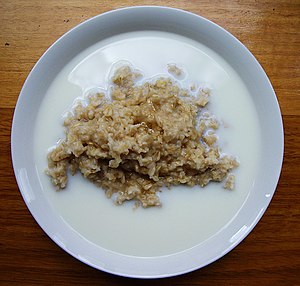Porridge

Porridge is a simple dish made by boiling oats (normally crushed oats, occasionally oatmeal) or another cereal in water, milk or both. Oat and semolina porridge are the most popular varieties in many countries. Some other cereals used for porridge include rice, wheat, peasemeal, barley, and cornmeal.
In many cultures, it is eaten as a breakfast, often with the addition of salt, sugar or milk. As the traditional breakfast of Scotland (where it is also spelled porage, after a popular brand name of oats) it is made with salt. Some manufacturers of breakfast cereal sell "ready-made" versions; aficionados question whether these can truly be called porridge. Gruel is a thin porridge made with water.
Traditions and uses
Porridge is one of the easiest ways to digest grains or legumes, and is used traditionally in many cultures to nurse the sick back to health. This is especially true of rice congee in traditional Chinese medicine. Mixed with herbs such as coriander, which is said to "detoxify mercury from the body", people who have heavy-metal poisoning from working in factories or mines are prescribed to eat this dish on a regular basis to maintain health.
Varieties
- oat porridge - can be made with steel-cut oats (traditional in Ireland and Scotland) or with rolled oats (traditional in England and the United States); known simply as porridge in the British Isles and as oatmeal or oatmeal mush in the United States; also a traditional Scandinavian and Icelandic breakfast.
- maize porridge
- grits, ground hominy grits or ground posole - traditional in the southern United States
- atole - Mexico—water, milk
- polenta - Italy
- mămăligă - Romania
- atole de chocolate or champurrado - Mexico—sugar, milk, chocolate. In the Philippines, it is usually rice with sugar, milk, and chocolate and spelled as "champorado."
- cornmeal mush - traditional dish in southern and mid-Atlantic US states
- ugali - Tanzania, pap - South Africa, sadza - Zimbabwe is staple food over a wide part of the African continent, particularly among the Makambo tribe.
- pease porridge (also peasemeal porridge) - made from dried peas, traditionally English and Scottish
- barley porridge
- wheat porridge
- cream of wheat or farina
- semolina
- polentina (could also be made from corn) - Italy—raisins, milk, sugar
- Wheatena - a brand name for a whole-wheat porridge
- uppama or uppma - a fried semolina (suzi or shuji) porridge traditional in southern India; flavored with clarified butter (ghee), fried onions, toasted mustard seeds, curry leaves; often mixed with vegetables and other foods, such as potatoes, fried dried red chilis, fried cauliflower, and toasted peanuts or cashew nuts.
- rice porridge
- congee (also jook (Cantonese) or xifan (Mandarin)) - with chicken or duck's eggs and pork, coriander leaf, fried wonton noodles, with fried bread (yao ja gwai (Cant.) or you tiao (Mand.))
- bubur - Malay
- Kayu - Japan—salt and green onions
- juk (죽) - Korea—with seafood, pine nuts, mushrooms, etc.
- kao dom - Thailand—cilantro, preserved duck eggs, fish sauce, sliced chili peppers, pickled mustard greens or salt cabbage preserves, red pepper flakes
- cháo – Vietnam – ground beef (cháo bò) or chicken (cháo gà); contains water and fish sauce; often served with scallions and fried sticks of bread
- arroz caldo or lugaw - Philippines—rice, water, saffron, ginger, meat optional
- risgrøt - Norway —made with rice with added vanilla, cooked with milk and served with cinnamon, sugar and butter.
- riisipuuro, risgrynsgröt, risengrød, risengrynsgrøt- Finland/Sweden/Denmark/Norway —a Christmas food, eaten with cinnamon and sugar
- buckwheat porridge
- quinoa porridge
- millet porridge
- oshifima or otjifima, a stiff pearl millet porridge is the staple food of northern Namibia.
- often seasoned with cumin and honey in the Middle East
- munchiro sayo is a part of Ainu cuisine (a native people of northern Japan)
- sorghum porridge
- Tolegi is a sorghum porridge eaten as a midday meal during the summer in New Guinea
- rye porridge
- ruispuuro - Finland - traditional Finnish breakfast
See also
- Ready Brek - a popular British brand of instant shredded oat cereal
- kasha (Russian word for porridge; an important part of Russian cuisine)
- krentjebrij - a traditional Dutch porridge-like dessert
- mush
- "Pease Porridge Hot," a children's nursery rhyme
- The Three Bears, a children's story featuring porridge (also Goldilocks and the Three Bears)
- The No true Scotsman fallacy
- Dalia, North Indian Breakfast item, primarily made of crushed (dulit) wheat grain boiled with water and preferably milk, considered easily digestible, nursing.[citation needed]
- Gofio made from roasted sweetcorn and other grains (e.g wheat, barley or oat). Gofio is still an important ingredient in Canary Islander cooking, and Canary Islander emigrants have spread its use to the Caribbean and all of Latin America. Gofio can be added to soups, stews, desserts, ice cream, sauces, and more.
- Instant Quaker Oatmeal
